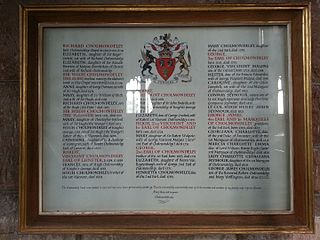The Office of the Lord Lieutenant was created during the reign of Henry VIII (1509–1547), taking over the military duties of the Sheriffs and control of the military forces of the Crown. From 1569 there was provision for the appointment of Deputy Lieutenants, and in 1662 the Lord-Lieutenant was given entire control of the militia. The Regulation of the Forces Act 1871 transferred this function back to the Crown, and in 1921, the office lost its power to call upon men of the county to fight in case of need. Since 1711 all the Lord Lieutenants have also been Custos Rotulorum of Devon.
This is a list of people who have served as Lord Lieutenant of Berkshire. Since 1689, all Lords Lieutenant have also been Custos Rotulorum of Berkshire.
This is a list of people who have served as Lord Lieutenant of Gloucestershire. Since 1694, all the Lord Lieutenants have also been Custos Rotulorum of Gloucestershire.
This is a list of people who served as Lord Lieutenant of Merionethshire. After 1762, all Lord Lieutenants were also Custos Rotulorum of Merionethshire. The office was abolished on 31 March 1974, and the area is now covered by the Lord Lieutenant of Gwynedd and Lord Lieutenant of Clwyd.
This is an incomplete list of people who have served as Lord Lieutenant of Norfolk. Since 1689, all Lord Lieutenants have also been Custos Rotulorum of Norfolk.
This is a list of people who have served as Lord Lieutenant of Herefordshire. Before the English Civil War, the lieutenancy of Herefordshire was always held by the Lord Lieutenant of Wales, but after the Restoration, its lieutenants were appointed separately. Since 1714, all the Lord Lieutenants have also been Custos Rotulorum of Herefordshire.
This is a list of people who have served as Lord Lieutenant of Cornwall. Since 1742, all the Lords Lieutenant have also been Custos Rotulorum of Cornwall.
The post of Lord Lieutenant of the North Riding of Yorkshire was created in 1660, at the Restoration. It was abolished on 31 March 1974, and replaced with the office of Lord Lieutenant of North Yorkshire. From 1782 until 1974, all Lords Lieutenant were also Custos Rotulorum of the North Riding of Yorkshire.
The following is a list of people who have held the title of Lord Lieutenant of Montgomeryshire. After 1761, all Lord Lieutenants were also Custos Rotulorum of Montgomeryshire. The office was abolished on 31 March 1974 and replaced by the Lord Lieutenant of Powys, with Deputy Lieutenants for Montgomeryshire.
This is an incomplete list of people who served as Lord Lieutenant of Denbighshire in Wales. After 1733, all Lord Lieutenants were also Custos Rotulorum of Denbighshire. The office was abolished on 31 March 1974, being replaced by the Lord Lieutenant of Clwyd.
This is a list of individual who served as Lord Lieutenant of Caernarvonshire. Since 1778, all Lord Lieutenants have also held the position of Custos Rotulorum of Caernarvonshire. The office was abolished on 31 March 1974 and succeeded by the position of Lord Lieutenant of Gwynedd.
This is a list of people who have served as Lord Lieutenant of Pembrokeshire. After 1715, all Lord Lieutenants were also Custos Rotulorum of Pembrokeshire. The county corporate of Haverfordwest was included in this lieutenancy, except for the period from 1761 to 1931, when there was a separate Lord Lieutenant of Haverfordwest. On 31 March 1974, the post was replaced by that of Lord Lieutenant of Dyfed.

Hugh Cholmondeley, 1st Earl of Cholmondeley, PC, styled The Honourable from birth until 1681 and then known as Viscount Cholmondeley to 1706, was an English peer and politician.

George Cholmondeley, 2nd Earl of Cholmondeley, PC, FRS, styled The Honourable from birth until 1715 and then known as Lord Newborough to 1725, was an English soldier. Cholmondeley was the second son of Robert Cholmondeley, 1st Viscount Cholmondeley, and Elizabeth Cradock. Hugh Cholmondeley, 1st Earl of Cholmondeley, was his elder brother. He was educated at Westminster School and Christ Church, Oxford. Cholmondeley supported the claim of William of Orange and Mary to the English throne and after their accession he was appointed a Groom of the Bedchamber.
The Governor of Chester was a military officer responsible for the garrison at Chester Castle. The equivalent or related role from the 11th to 14th centuries was Constable of Chester.
This article is about the particular significance of the year 1725 to Wales and its people.
This article is about the particular significance of the year 1713 to Wales and its people.

